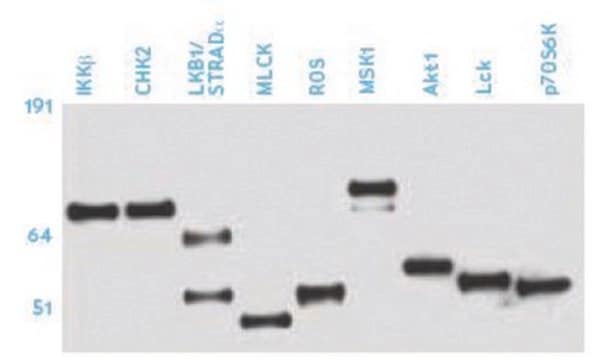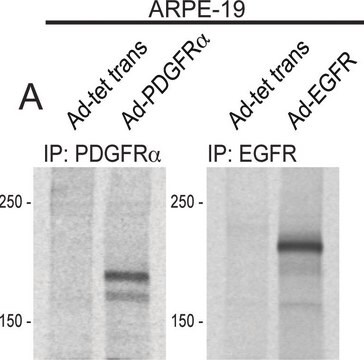05-779
Anti-Meis 1/2/3 Antibody, clone 9.2.7
ascites fluid, clone 9.2.7, Upstate®
Sign Into View Organizational & Contract Pricing
All Photos(1)
About This Item
UNSPSC Code:
12352203
eCl@ss:
32160702
NACRES:
NA.41
Recommended Products
biological source
mouse
Quality Level
antibody form
ascites fluid
antibody product type
primary antibodies
clone
9.2.7, monoclonal
species reactivity
mouse, human
manufacturer/tradename
Upstate®
technique(s)
immunohistochemistry: suitable
immunoprecipitation (IP): suitable
western blot: suitable
isotype
IgG1
NCBI accession no.
UniProt accession no.
shipped in
dry ice
target post-translational modification
unmodified
Gene Information
human ... MEIS2(4212)
General description
Hox, Pbx, and Meis families of transcription factors form heteromeric complexes and bind DNA through specific homeobox domains. Meis1, 2, and 3 are members of the TALE (three amino acid loop extension) family of homeodomain containing proteins. Meis1 binds to Hox and Pbx proteins to form complexes with distinct DNA-binding specificities. Like Hox and Pbx proteins, the overexpression of Meis1 in BHX-2 myeloid leukemias implies a role for this protein in oncogenesis. Two Meis related proteins, Meis2 and Meis3 (also designated Mrg1 and Mrg2, respectively), possess largely similar sequence identity with Meis1 and express in normal tissues as well as myeloid leukemias. In the pancreas, Meis2 preferentially associates with Pbx1, and together they associate with the pancreas specific homeodomain factor, Pdx1, to repress Pdx1-induced transcriptional activation.
Specificity
Meis1, Meis2, Meis3 and splice variants
Immunogen
MBP-conjugated fusion protein corresponding to amino acids 60-390 of mouse Meis1
Application
Detect Meis 1/2/3 with Anti-Meis 1/2/3 Antibody, clone 9.2.7 (Mouse Monoclonal Antibody), that has been shown to work in IP, WB & IHC.
Research Category
Epigenetics & Nuclear Function
Epigenetics & Nuclear Function
Research Sub Category
Transcription Factors
Transcription Factors
Quality
routinely evaluated by immunoblot on nuclear extract from K562 cells
Target description
Mr ~45-66kDa
Linkage
Replaces: MABN1071
Physical form
Ascites
mouse ascites IgG1 containing 0.05% sodium azide before the addition of glycerol to 30%
Storage and Stability
2 years at -20°C
Analysis Note
Control
K562 nuclear extract
K562 nuclear extract
Legal Information
UPSTATE is a registered trademark of Merck KGaA, Darmstadt, Germany
Disclaimer
Unless otherwise stated in our catalog or other company documentation accompanying the product(s), our products are intended for research use only and are not to be used for any other purpose, which includes but is not limited to, unauthorized commercial uses, in vitro diagnostic uses, ex vivo or in vivo therapeutic uses or any type of consumption or application to humans or animals.
Not finding the right product?
Try our Product Selector Tool.
Storage Class Code
10 - Combustible liquids
WGK
WGK 1
Certificates of Analysis (COA)
Search for Certificates of Analysis (COA) by entering the products Lot/Batch Number. Lot and Batch Numbers can be found on a product’s label following the words ‘Lot’ or ‘Batch’.
Already Own This Product?
Find documentation for the products that you have recently purchased in the Document Library.
Eugeniu Nacu et al.
Nature, 533(7603), 407-410 (2016-04-28)
In salamanders, grafting of a left limb blastema onto a right limb stump yields regeneration of three limbs, the normal limb and two 'supernumerary' limbs. This experiment and other research have shown that the juxtaposition of anterior and posterior limb
Merrick Strotton et al.
Nature methods, 20(9), 1310-1322 (2023-09-01)
Rapid, highly multiplexed, nondestructive imaging that spans the molecular to the supra-cellular scale would be a powerful tool for tissue analysis. However, the physical constraints of established imaging methods limit the simultaneous improvement of these parameters. Whole-organism to atomic-level imaging
Fabrice Bouilloux et al.
eLife, 5 (2016-02-10)
Although cardio-vascular incidents and sudden cardiac death (SCD) are among the leading causes of premature death in the general population, the origins remain unidentified in many cases. Genome-wide association studies have identified Meis1 as a risk factor for SCD. We
The miR-17∼92 cluster contributes to MLL leukemia through the repression of MEIS1 competitor PKNOX1.
Yousaf A Mian et al.
Leukemia research, 46, 51-60 (2016-04-29)
Mixed lineage leukemias have a relatively poor prognosis and arise as a result of translocations between the MLL(KMT2A) gene and one of multiple partner genes. Downstream targets of MLL are aberrantly upregulated and include the developmentally important HOX genes and
Siew-Lee Goh et al.
The Journal of biological chemistry, 284(28), 18904-18912 (2009-05-29)
The transcription factor encoded by the murine ecotropic integration site 1 gene (MEIS1) is a partner of HOX and PBX proteins. It has been implicated in embryonic patterning and leukemia, and causally linked to restless legs syndrome. The MEIS1A C
Our team of scientists has experience in all areas of research including Life Science, Material Science, Chemical Synthesis, Chromatography, Analytical and many others.
Contact Technical Service






